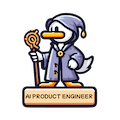🚀 AI Product Engineers - The Key to Unlocking LLM's Full Potential
Why AI Product Engineers Are the Heroes We Need to End the AI Product Drought
LLMs (Large Language Models) feel like pure magic, don't they? But here's the kicker: despite this magic, we're struggling to turn LLMs into game-changing products. 🤔
Why Are Products Stuck? LLMs Have Shaken Up the Software World
For decades, our industry has mastered the art of turning ideas into real, impactful products. It's not just about writing code; it's about understanding what to build. UX researchers, product managers, designers, and engineers all play a role in crafting a clear vision and turning it into a product people love. But when an LLM enters the picture, things get tricky.
LLMs bring endless possibilities—and with them, endless ambiguity. Suddenly, our tidy user flows and engineering blueprints are tossed out the window, replaced by a messy web of "what ifs."
The Need for a New Kind of Engineer
In my experience (and trust me, I've been in the trenches), many teams dive into AI projects full of enthusiasm, only to get bogged down in confusion. They start with brilliant ideas—like a personal AI that reads and summarizes your emails. But soon, they hit a wall: What does "important" mean? How should the summary look? Should it even be text? Or audio? Interactive, perhaps? These are tough questions that no one on the team is equipped to answer.
- Designers can imagine software, but AI behaviors? That's another story.
- Researchers know the cutting edge, but without clear goals, it's just theory.
- Engineers can optimize, but what are they optimizing for?
- UX researchers understand user problems, but not how an LLM might solve them.
- Product managers can balance trade-offs, but rely on others to define what's possible.
So, what's missing? A new breed of engineer—an AI Product Engineer.
Introducing the AI Product Engineer 🧑💻
An AI Product Engineer isn't just a coder—they're a creator, an innovator, and a problem-solver. They blend software engineering with product design and AI expertise to answer the ultimate question: "What do we want the model to do?"
Here's what makes an AI Product Engineer stand out:
- LLM Enthusiast: They understand AI inside out, just like they understand the users.
- Prototype Master: They build prototypes that explore different model behaviors, combining tech skills with product design.
- Fearless Innovator: They tackle the "blank page" ambiguity head-on, shaping AI into something usable, something meaningful.
With these skills, AI Product Engineers will revolutionize product development. No longer will algorithms be just the domain of data scientists; they'll be sculpted by engineers with a vision. This is where the future of tech lies—unlocking LLM's true potential and transforming it into products that change lives.
What Do You Think? 💬
We're on the brink of something big, and we need your thoughts! Are you excited about the rise of AI Product Engineers? How do you see them shaping the future? Drop your thoughts in the comments below!


